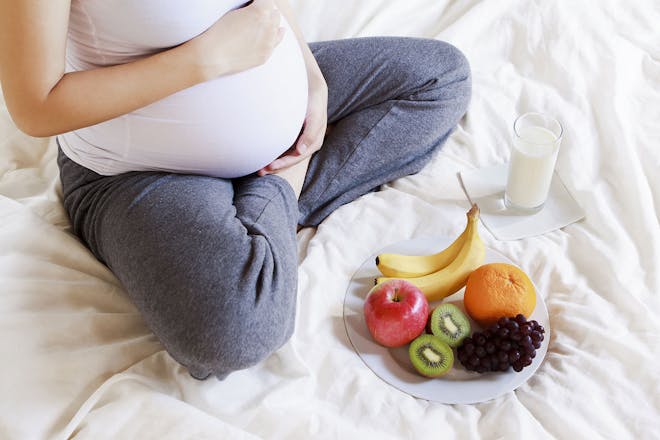Can you eat Caesar salad when pregnant?

This page contains affiliate links, which means we may earn a small amount of money if a reader clicks through and makes a purchase. All our articles and reviews are written independently by the Netmums editorial team.
Find out if it's safe to eat Caesar salad dressing during pregnancy. Plus precautions to take to keep you and your baby healthy.
The official advice on eating Caesar salad in pregnancy
Good news! Caesar salad is usually safe to eat during pregnancy. Just make sure that any raw eggs used either have a red British Lion stamp, or are pasteurised.
Caesar salad is a delicious healthy mix of Romaine lettuce and crusty bread croutons, sprinkled with parmesan cheese (which is safe to eat in pregnancy). You can add torn chicken pieces or anchovies according to taste.
A classic Caesar salad dressing is made with olive oil, black pepper, lemon juice, garlic and mustard.
FREE NEWBORN NAPPIES
Many recipes also use raw egg yolks. You'll need to take care with these while you're pregnant, or you can use a shop-bought salad dressing to be on the safe side.
Raw eggs and mayonnaise
If you're making Caesar salad at home, ensure that any raw eggs you're using have a red British Lion stamp on them. The NHS advises against eating raw eggs during pregnancy unless they are British Lion stamped eggs.
This is because raw eggs can carry salmonellae bacteria, which could lead to food poisoning. Salmonella is unlikely to harm your growing baby, but it could make you very unwell.

Eggs with the British Lion stamp come from hens that have been vaccinated against salmonella. This means the risk of food poisoning is extremely low. These eggs can be used raw in your Caesar salad recipe.
Most shop-bought salad dressings, including supermarket-own options, will be made using pasteurised eggs. This means they are safe to eat during pregnancy. Pasteurisation is a heat-treatment process designed to kill harmful bacteria like salmonellae. If you're buying a freshly-made salad dressing, you can always double-check the ingredients at the shop.
If you're making your own Caesar salad, use eggs with the British Lion stamp. Alternatively, skip the raw eggs altogether, and use a shop-bought mayonnaise as a substitute (shop-bought mayonnaise is made with pasteurised eggs, and safe to eat in pregnancy).
If you're having Caesar salad in a restaurant, you can always check whether it's made with raw egg yolks. If so, only eat it if the restaurant can confirm that they've used British Lion stamped eggs.
Chicken
If you're having chicken strips with your homemade Caesar salad, be sure to cook it well before serving. The NHS says that all meat eaten during pregnancy must be thoroughly cooked, with no trace of blood or pink.
This is because raw or uncooked meat can carry a parasite that causes toxoplasmosis. This could make your unborn baby very unwell, and lead to a small risk of miscarriage or stillbirth.
Anchovies
Anchovies are safe to eat during pregnancy, provided they come from a tin. The NHS advises against eating certain fish while you're pregnant, because there can be a small risk of mercury poisoning.
However, according to Healthline, anchovies contain a very small amount of mercury at just 0.017 ppm (parts per million). This makes them safe to eat during pregnancy. Because anchovies have such an intense flavour, it's unusual to eat them in large quantities anyway.
Avoid eating raw marinated anchovies served in an open container from a deli counter. You'll be able to spot the uncooked white fish and they'll usually still have the skin on too.
Raw fish is best avoided because it can contain harmful bacteria, which could give you food poisoning.
Tinned or canned anchovies aren't pasteurised, because the heat treatment would ruin the delicate fish. However they are often preserved with a large amount of salt. Research shows that it's extremely difficult for bacteria to survive this process, which means that salted anchovies are safe to eat. Too much salt isn't good for you in pregnancy though, so do eat them in moderation.
Parmesan
Hard cheeses like parmesan, pecorino and Cheddar are safe to eat during pregnancy, as long as they're made with pasteurised milk (supermarket versions almost always are).
If you want to substitute a different kind of cheese, make sure it's pasteurised, and steer clear of mould-ripened soft cheeses like brie and camembert, and soft blue cheeses like danish blue and gorgonzola (unless cooked until steaming hot).
Romaine Lettuce
Green leaves are a nutritious part of any salad – just make sure you wash them well before you eat them.
Research has shown that Romaine lettuce can sometimes carry listeria bacteria. There's a small risk that this could cause an infection called listeriosis, which can make you and your unborn baby very unwell.
All salad can also contain toxoplasma; a type of parasite that lives in the soil and can lead to toxoplasmosis, which sadly increases the risk of miscarriage and stillbirth.
However, the risks are small, and thoroughly washing your salad before you eat it will reduce them even further. Washed salad is perfectly safe to eat during pregnancy, and a healthy way to get the vitamins and minerals you need.
Delicious salad recipes
Love salad? Why not try one of these great pregnancy-safe recipes?
- Tomato salad
- Quinoa and summer veg salad
- Chicken pasta salad
- Superfast superfood salad (use pasteurised feta)
The Day-by-Day Pregnancy Book: Count Down Your Pregnancy Day by Day by Dr Maggie Blott is packed full of advice from a team of experts to help guide you through your pregnancy from conception to birth. See more details here at Amazon.
Looking for more pregnancy diet info? Check out our articles below, or swap tips with other mums-to-be in our forum.





